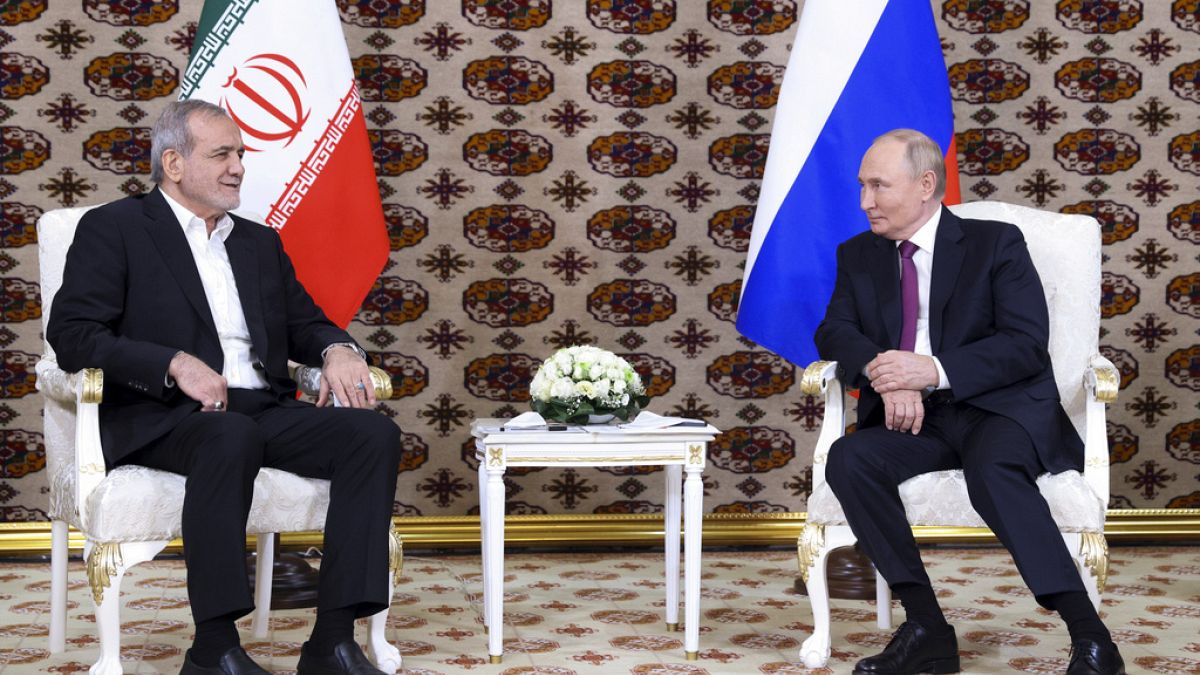In a recent development, Moscow and Tehran have signed a $1.7 billion deal for Iran to export drones to Russia after Putin sent troops into Ukraine in 2022. This agreement has raised concerns about Iran’s steady supply of weapons for Moscow’s war in Ukraine as well as the escalating conflicts in the Middle East. Russian President Vladimir Putin met with Iran’s newly elected president Masoud Pezeshkian in person to discuss the attacks between Israel and Iran and its militant allies. The two leaders also talked about creating a “new world order” of Moscow’s allies to counter the West.
During their meeting, Putin expressed that Moscow and Tehran’s positions on international events are often very close. He emphasized the need for cooperation between the two countries, stating that they must help each other in their relationships. Pezeshkian echoed Putin’s sentiments, highlighting the similarities in their principles and positions in the international arena. He condemned the Israeli military operations in Lebanon as “savage” and “beyond description,” pointing to the rise in assassination and sabotage attempts in the region.
The Israeli military’s actions in southern Lebanon and airstrikes against Iran-backed Hezbollah fighters have further escalated tensions in the region. Putin’s invasion of Ukraine has prompted Iran to export drones to Russia, leading to increased scrutiny from the US, which believes that Iran has also transferred short-range ballistic missiles to Russia. This has raised concerns among Western countries, with Britain’s domestic intelligence agency MI5 accusing Russia and Iran of carrying out a “staggering” rise in attempts at assassination, sabotage, and other crimes on UK soil.
Ken McCallum, the head of MI5, revealed that his agents and police have foiled 20 “potentially lethal” plots backed by Iran since 2022. He warned that Iran could expand its targets in the UK if conflicts in the Middle East deepen. This statement underscores the growing security threats posed by Russia and Iran’s actions in the region. As tensions continue to rise, it remains critical for international leaders to address and resolve these conflicts through diplomatic means to prevent further escalation and loss of life in the region.
The conference in Ashgabat, attended by regional leaders including Russian President Vladimir Putin, Iranian President Masoud Pezeshkian, Pakistani President Asif Ali Zardari, and heads of Central Asian nations, serves as a platform for discussions on regional security and cooperation. The meeting between Putin and Pezeshkian highlights the complex dynamics at play in the Middle East and Central Asia, as various countries navigate competing interests and alliances. The agreement between Moscow and Tehran to export drones to Russia further complicates the geopolitical situation in the region, raising concerns about the potential implications for international security.
In conclusion, the $1.7 billion deal between Russia and Iran for the export of drones underscores the deepening ties between the two countries and their shared interests in countering Western influence. The escalating conflicts in the Middle East, particularly between Israel and Iran-backed militant groups, have further strained regional stability and raised concerns about security threats in the region. As international leaders navigate these complex dynamics, it is essential to prioritize diplomacy and dialogue to address the root causes of conflicts and prevent further escalation of violence. The recent developments between Russia, Iran, and the US highlight the urgent need for coordinated efforts to promote peace and stability in the region.










